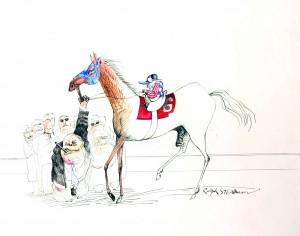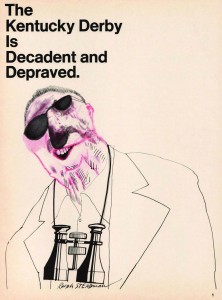
Ginsberg and Gonzo, oh my! April 18 through 21, SF Jazz is presenting two new projects based on works by Gonzo journalist Hunter S. Thompson and poet Allen Ginsberg. Two very different San Francisco literary icons, two very different performances. Guitarist, composer and SF Jazz Resident Artistic Director Bill Frisell, actress/director Chloe Webb, Grammy winning producer Hal Willner, artist Ralph Steadman, and Academy Award winner Tim Robbins make up the creative teams for Allen Ginsburg's Kaddish and Hunter S. Thompson's The Kentucky Derby. Both events are described as multimedia projects: Steadman's art, Webb's direction and narratives pulled from the words of the authors and Frisell's music together make a performance of both the theater and jazz worlds.
Allen Ginsberg's Kaddish is based on the poem Ginsberg penned upon the suicide of his mother. Frisell explores the poem musically while Webb brings the words to life on stage. Steadman's art on screen vividly illustrated the poem's imagery. Hunter S. Thompson's The Kentucky Derby takes Thompson's notorious essay and stages a live reading with Tim Robbins in the part of Thompson and director Webb in various other roles (including, she says, a Steadman illustrated horse). Frisell previously had set the essay to music last year with the "musical radio play," The Kentucky Derby is Decadent and Depraved.
I spoke to Webb (who first shot to fame as an actress playing the doomed Nancy Spungen to Gary Oldman's Sid Vicious in the 1986 biopic Sid and Nancy) about the projects, Allen Ginsberg and Hunter S. Thompson, Gonzo artist Ralph Steadman, working with Bill Frisell and SF Jazz and...mushrooms.
Allen Ginsberg and Hunter S. Thompson are such iconic figures in American literature. How did it feel tackling them both in Bill Frisell's new SF Jazz projects?
The thing that's amazing about Allen and Hunter was that they were both really singular people, kind of crazy who went kind of out of town and took as much space as they needed. They were outsiders, who eventually people turned around and saw things their way. They were indomitably devoted and changed whole genres. What Allen did for poetry, with Howl and Kaddish, still influences writers. Ralph took gonzo journalism with Hunter and it IS a genre now. What made them so iconic was a definite point of view. They both had a moral point of view, I know this might sound bizarre, but they were really about pointing out imbalance and injustice. I know who I am and I'm upfront about it, what are you? It's so funny because a lot of young actors and filmmakers making independent films are making films about the Beats, there's like five movies out about the Beats, while mainstream culture is obsessed with the conformity of Mad Men. That's what the Beats were rebelling against. It's a gift, season after season, kids coming into adulthood get to discover the Beats and Hunter. I think Hunter's tricycle went on two wheels there toward the end. I guess if you're going to ride a trike, you want to have on all three.


